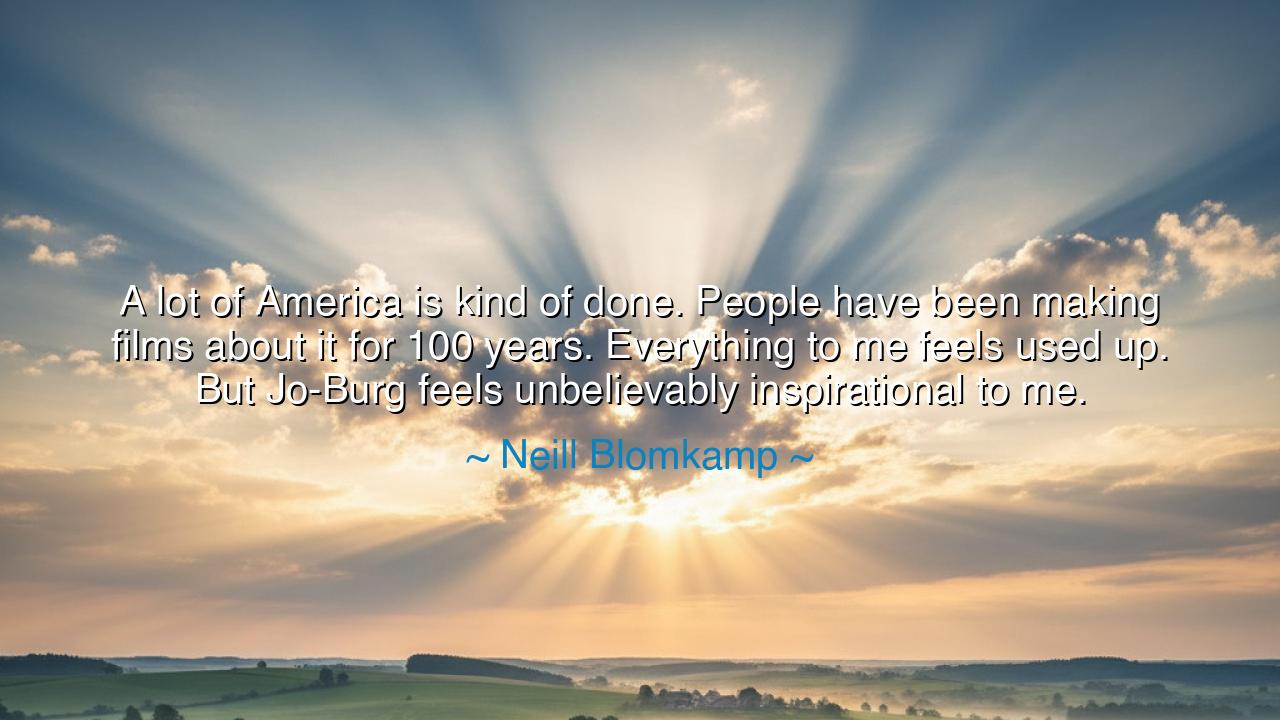
A lot of America is kind of done. People have been making films
A lot of America is kind of done. People have been making films about it for 100 years. Everything to me feels used up. But Jo-Burg feels unbelievably inspirational to me.






In the vivid and impassioned words of Neill Blomkamp, we hear the voice of a creator searching for new frontiers: “A lot of America is kind of done. People have been making films about it for 100 years. Everything to me feels used up. But Jo-Burg feels unbelievably inspirational to me.” Beneath these words lies not disdain, but longing — the yearning of an artist for fresh vision, for landscapes untold and stories unshaped by repetition. Blomkamp, who grew up in Johannesburg, speaks as one who has witnessed both the chaos and beauty of a place rarely seen through the world’s lens. His statement is a declaration of creative rebellion — a refusal to walk the worn paths of others and a desire to carve new roads where imagination can still breathe.
The meaning of his words lies in the contrast between the familiar and the undiscovered. When Blomkamp says that “America is kind of done,” he speaks of cultural saturation — of the way endless retelling can dull the spirit of even the richest narrative. For a century, filmmakers have explored the myths of the West, the skyline of New York, the dream and disillusionment of its people. These stories, though profound, have become echoes of themselves. To Blomkamp, the soil feels overtilled — yielding form but not freshness. But when he turns his gaze toward Jo-Burg — the affectionate name for Johannesburg, his homeland — he finds not exhaustion but energy. There, in the raw and unpredictable heart of South Africa, he discovers the inspirational chaos that awakens the artist’s hunger: a place where history, struggle, and hope collide in new, electric ways.
The origin of this creative philosophy stretches back to the dawn of human storytelling. The ancients, too, understood that the spirit grows weary when it feeds on the same visions for too long. Homer, though Greek, sang of Troy — not of Athens — because he sought the drama that lay beyond his doorstep. Marco Polo crossed seas and deserts in search of wonder, bringing back tales of lands unseen that reawakened Europe’s imagination. Likewise, Neill Blomkamp stands among those who leave the familiar, seeking truth not in polished perfection but in the roughness of reality. To him, Johannesburg — with its stark inequalities, its fusion of technology and poverty, its mix of hope and ruin — becomes a mirror for humanity itself, unfiltered and alive.
In his film “District 9,” Blomkamp embodied this very idea. Set not in the glossy towers of Los Angeles or the tidy suburbs of the American dream, but in the dusty outskirts of Johannesburg, it told a story of alien refugees and human cruelty that transcended borders. The film’s realism — its grit, its social tension, its strange beauty — made it unlike anything Hollywood had known. Critics saw it as science fiction reborn, not because of its technology, but because of its truth. Through the lens of South Africa’s pain and resilience, Blomkamp found what America’s overused backdrops could no longer offer: originality born of struggle, imagination rooted in reality.
His words also speak to a deeper human truth — that inspiration is not found where comfort dwells. Just as the ancient mariners found new worlds only when they dared to lose sight of familiar shores, so must the artist — and indeed, every soul — leave behind the overfamiliar if they wish to rediscover wonder. The landscapes of the human spirit, like those of the earth, grow stale when overvisited. But in the untamed, in the unpredictable, in the places where light and shadow mingle fiercely, the muse is reborn. Blomkamp reminds us that the world’s creative heart still beats loudest in places the world has overlooked.
And yet, there is humility in his declaration. He does not curse America’s art, nor deny its influence — he merely acknowledges its completion. Like a field once fertile, it has borne much fruit. But new soil must now be tilled elsewhere. In this recognition lies the wisdom of renewal — the understanding that every age and every place must yield to another, that creativity, like civilization itself, must migrate to remain alive. It is the cycle of artistic life: discovery, creation, exhaustion, and rebirth.
Thus, the lesson of Neill Blomkamp’s words extends beyond cinema. Seek always the unfamiliar, for it is there that the soul expands. Do not linger too long in the comfort of the known; the well that once nourished may grow dry. Instead, turn your eyes toward your own “Jo-Burg” — the unpolished corner of your world that still vibrates with truth and untold stories. For whether you are a painter, a thinker, or a dreamer, your greatest art will be born not from imitation, but from exploration.
So let us heed his call: step beyond the used up, embrace the inspirational unknown, and find beauty where others have not yet thought to look. For in those wild, uncelebrated places — whether in a city, a thought, or the heart itself — lie the seeds of renewal, waiting for those brave enough to see them.






AAdministratorAdministrator
Welcome, honored guests. Please leave a comment, we will respond soon